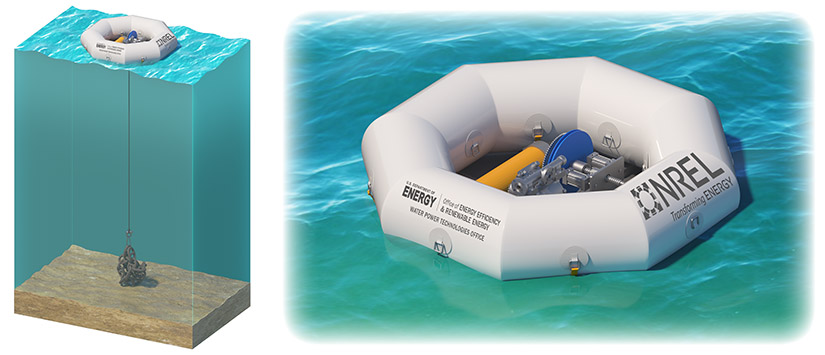Charting the Course: NREL Team To De-risk Desal Device Deployment
NREL Researchers Work To Transform Seawater Into Drinking Water as We Commemorate World Water Day 2021

It is easier to dive in with confidence after testing the water first—and National Renewable Energy Laboratory (NREL) researchers are building this confidence with the development of a simple, easily deployable wave-energy-powered desalination device. Their goal? Reducing the deployment risk for competitors of the Waves to Water Prize.
Supported by the U.S. Department of Energy’s (DOE’s) Water Power Technologies Office (WPTO) and administered by NREL, the five-stage, $3.3 million contest aims to accelerate innovation in small, modular, wave-powered desalination systems capable of producing clean water in disaster and recovery scenarios, as well as in water-scarce coastal and island locations.
Today, as we commemorate World Water Day 2021, more than 1.1 billion people lack access to potable water, and the growing impacts of climate change are likely to worsen this reality. Through competitions such as the Waves to Water Prize, NREL and WPTO are inspiring climate innovators to rise to meet our resiliency challenges.
Diving In
Jennette’s Pier in North Carolina’s Outer Banks will host the cadre of Waves to Water competitors in April 2022.
The prize is currently in the CREATE Stage, and teams have 180 days to build a functional prototype or proof of concept of their system. The competitors will also have a unique opportunity to collaborate with external organizations that are supporting their innovations.
Janicki Industries, an aerospace engineering firm, will provide valuable design-for-manufacturing feedback, as well as offer office hours for the competitors. The International Desalination Association will host technical seminars for the teams on desalination and commercialization principles as well as promoting these solutions to the international desalination community.
In April 2022, as part of the final DRINK Stage, teams will deploy their devices, demonstrating their concepts' viability in real ocean conditions.
Ensuring Smooth Sailing
Employing hydrodynamic modeling coupled with top-notch simulation capabilities, NREL researchers are ensuring a fair contest by building a robust desalination device to de-risk the deployment of each of the competing devices in the Waves to Water Prize.
In development of their hydraulic and electric reverse osmosis (HERO) wave energy converter (WEC) device, the NREL team was guided by the parameters to which Waves to Water Prize competitors must adhere. However, unlike the competitors, NREL designed and built their system to provide the CSI team installation practice and validation of measurement practices, rather than produce the most or cleanest water.
The resulting device features a modular power take-off, with the capabilities to test both hydraulic and electric systems to better understand how the deployment process might vary between these types of submissions. The device will enable the researchers to effectively assess various aspects of the competition process, including measurement techniques.
A primary focus of the team is ensuring the efficiency and safety of device installation and removal—for both the Coastal Studies Institute (CSI), the partner for the final stage of the prize, as well as for the competitors.
Additionally, NREL is evaluating the complexities involved in anchoring the devices. As part of this work, they will determine guidelines for electric, hydraulic, and anchoring connection points to inform the competitors in their design process, as well as identify possible device failure points.
Once the device is finalized, NREL intends to publicly release associated modeling results, design drawings, and a list of build materials to address information gaps and encourage others to replicate and build upon the technology.
From Prizes to Power at Sea
NREL’s work on the desalination HERO WEC device carries implications that extend beyond the Waves to Water Prize. Future marine energy developers can build upon the resulting data and use the device as a baseline of comparison with other marine energy devices, helping to advance their own research.
Through the development of a publicly available device, NREL’s intention is to assist other innovators by pinpointing what works, what does not, and provide a basis from which others can build and modify their own designs. Industry can apply lessons learned from this device to produce future technologies that can provide power at sea and build resilient coastal communities, evolve ocean observation, or support post-disaster relief efforts.
Learn more about the Waves to Water Prize and how you can support the work of these daring competitors.
Last Updated Jan. 22, 2026
